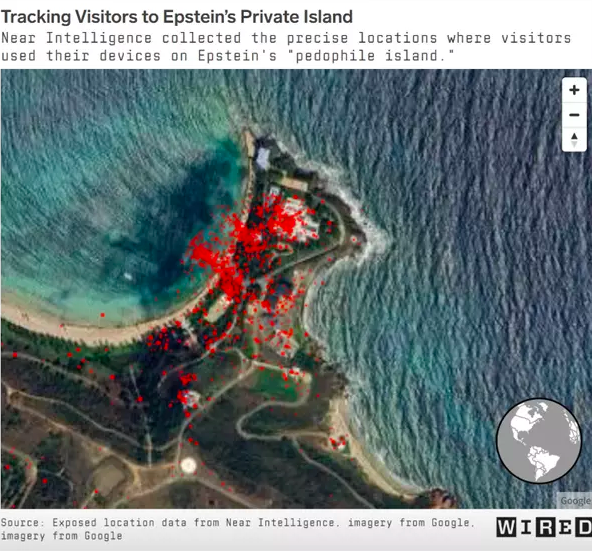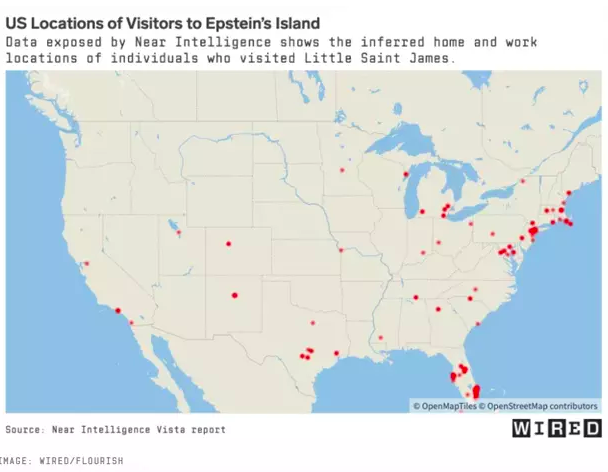
Personal details including residences and workplaces of VIP elite pedophiles who visited Jeffrey Epstein's notorious “pedophile island” have been exposed in a massive data leak from Near Intelligence, a data broker with defense industry ties.
The cellphone data leaked by Near Intelligence reveals with “high precision” the residences of many guests of Epstein's Little Saint James, where Epstein groomed, assaulted, and trafficked countless underage girls, many of whom were as young as 12 according to the US Virgin Islands attorney general.
Guests on the island are known to include a host of household names, including international political leaders, CEOs, royalty, and A-list celebrities. Epstein's associate Ghislaine Maxwell was convicted in 2021 on five counts including sexual trafficking of children by force – however, the identity of whom she trafficked the children to remains a closely guarded secret.
However, the Near Intelligence data leak reveals 11,279 cellphone coordinates that expose the flood of wealthy and powerful visitors over a three year period to Epstein's child trafficking hub in the US Virgin Islands.
The data also reveals 166 locations throughout the US where visitors to Little St. James lived and worked. The leaked cache also points to locations in Ukraine, the Cayman Islands, and Australia where visitors to Epstein's island began their journeys to visit the island.

Wired reports: The coordinates that Near Intelligence collected and left exposed online pinpoint locations to within a few centimeters of space.
Visitors were tracked as they moved from the Ritz-Carlton on neighboring St. Thomas Island, for instance, to a specific dock at the American Yacht Harbor—a marina once co-owned by Epstein that hosts an “impressive array” of pleasure boats and mega-yachts.
The data pinpointed their movements as they were transported to Epstein’s dock on Little St. James, revealing the exact routes taken to the island.
The tracking continued after they arrived. From inside Epstein's enigmatic waterfront temple to the pristine beaches, pools, and cabanas scattered across his 71-acres of prime archipelagic real estate, the data compiled by Near captures the movements of scores of people who sojourned at Little St. James as early as July 2016.
The recorded surveillance concludes on July 6, 2019—the day of Epstein’s final arrest.

The coordinates also point to various Epstein properties beyond Little St. James, including his 8,000-acre New Mexico ranch and a waterfront mansion on El Brillo Way in Palm Beach, where prosecutors said in an indictment that Epstein trafficked numerous “minor girls” for the purposes of molesting and abusing them.
Near Intellgence’s data is notably missing any locations in Europe, where citizens are safeguarded by comprehensive privacy laws.
Near Intelligence’s maps of Epstein’s island reveal in stark detail the precision surveillance that data brokers can achieve with the aid of loose privacy restrictions under US law. The firm, which has roots in Singapore and Bengaluru, India, sources its location data from advertising exchanges—companies that quietly interact with billions of devices as users browse the web and move about the world.
Before a targeted advertisement appears on an app or website, phones and other devices send information about their owners to real-time bidding platforms and ad exchanges, frequently including users’ location data.
While advertisers can use this data to inform their bidding decisions, companies like Near Intelligence will siphon, repackage, analyze, and sell it.
Officially, this data is intended to be used by companies hoping to determine where potential customers work and reside.
But in October 2023, the Wall Street Journal revealed that Near had once provided data to the US military via a maze of obscure marketing companies, cutouts, and conduits to defense contractors.
Baxter Dmitry
Email: This email address is being protected from spambots. You need JavaScript enabled to view it.
Latest posts by Baxter Dmitry (see all)
Source link

